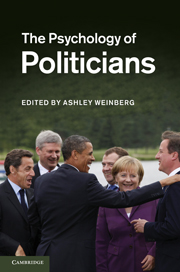1 - The psychology of politicians
Published online by Cambridge University Press: 05 December 2011
Summary
Politics is living history. It is about people and their ideas, desires, needs and their striving to debate, negotiate, protest, fight and even die in pursuit of their goals over thousands of years. Political activity has evolved to take place within institutions, punctuated with crises when peoples and nations have taken matters into their own hands and demonstrated their will through public protest and revolution. In such ways, history tends to show that our species likes to exercise control over events. Accordingly we are fascinated by civilisations that no longer exist and the reasons they ended in ruins. If something of their history is known, it is the names of their leaders, for great efforts have been made to preserve such information, perhaps as their way to ensure everlasting glory. We marvel at objects dedicated to them: pyramids, decorative statues and columns, art and artefacts. Then we ask, where did it all go wrong for those who seemed to have the world at their feet? Why did they fail?
Of course, nature has had its part to play and in time global warming might ensure that it is not only the Danish King Canute who is famed for his attempts to turn back the tide. So is it learning or luck, design or fate which has thus far ensured our survival? Recent history recognises the steady hand of leaders such as Gorbachev in ending the Cold War and Churchill in leading Britain to victory in the Second World War, but we are also aware there have been many calamitous leaders, highlighted by the rise of grisly dictators (there are many from which to choose) and ill-fated decisions to pursue this or that doomed course of action. Since the Second World War, the Suez Crisis, the Bay of Pigs invasion and the Vietnam War are high-profile reminders of such events, yet in one way these represent comparatively recent landmarks in the evolution of political thought and action. In other words, failures in governments are commonplace and occasionally such mistakes lead to the fall of a state or the birth of another.
- Type
- Chapter
- Information
- The Psychology of Politicians , pp. 1 - 18Publisher: Cambridge University PressPrint publication year: 2011



